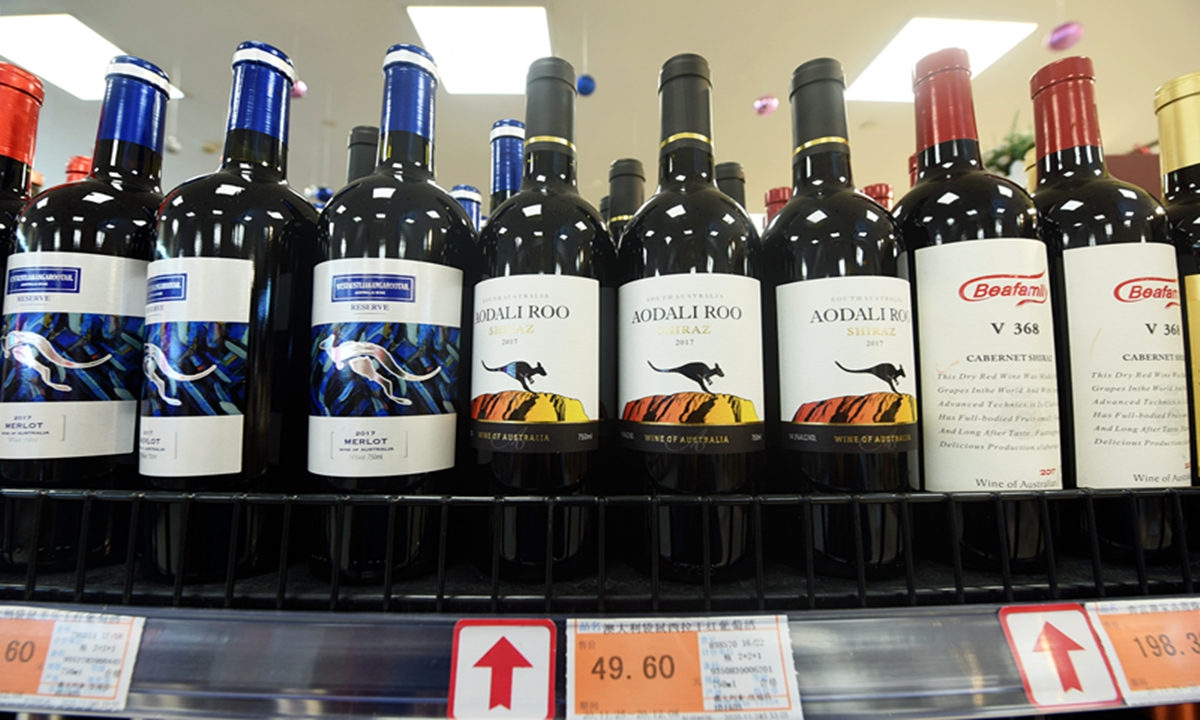It's Australia, not China that's violating free trade deal, analysts say, urging China to resort to international courts
By Xie Jun and Chi Jingyi Source: Global Times Published: 2020/12/17 22:38:40

Bottles of Australian wine on the shelf of a supermarket in Hangzhou, East China's Zhejiang Province on November 27, 2020 Photo: VCG
Economists laughed at Australia's attempts to crack down on China by taking legal action against the country under the China-Australia Free Trade Agreement (ChAFTA), saying that it is Australia instead of China that is violating the terms of the agreement, and that China should resort to international courts more often to safeguard its interests.
According to the Australian Financial Review, Australian exporters that are caught in the China-Australia trade dispute are considering suing the Chinese government for violating the ChAFTA. In particular, they have accused China of "discriminatory trade action" against Australian investors in China, which they said violated a provision of the ChAFTA.
One day earlier, Australia formally referred China to the World Trade Organization (WTO) over China's imposition of anti-dumping and anti-subsidy duties against Australian barley.
Gao Feng, a spokesperson of the Ministry of Commerce in China, said on Thursday that China has always pursued trade remedies consistent with WTO rules. "We will handle Australia's request for consultation in line with WTO dispute settlement procedures," he said.
Experts said that Australia's accusations against China over the ChAFTA are "contrary to the fact", citing China's efforts such as decreasing tariffs on Australian imports for six years since 2015 and scrapping import taxes on about 95 percent of Australia imports as proof that China has been actively executing the ChAFTA.
In particular, Australia's claim that China is taking discriminatory action against Australian investors is "totally ungrounded," said Song Wei, an associate research fellow at the Chinese Academy of International Trade and Economic Cooperation.
"China's openness and non-discriminatory policies have won comprehensive recognition in the international community, with efforts such as implementing the negative list mechanism and opening multiple free trade zones," she told the Global Times.
She also stressed that China's imposition of tariffs on Australian barley is not a violation of the ChAFTA, because China's investigation has found that Australia sold barley to China at a price below its domestic market price, which hurt the interests of Chinese barley growers and dealers who handle the crop.
According to chapter 2 of the ChAFTA, neither China nor Australia should increase any existing customs duty on each other's imported goods, unless they are anti-dumping duties.
A Beijing-based analyst of international law surnamed Yao told the Global Times on Thursday on condition of anonymity that when the two parties signed the FTA, they definitely indicated the dispute settlement measures.
"If the FTA provides for anti-dumping situations, then the protection regulations are not applicable, and Australia cannot use the protection regulations to sue China, or the suit will not be successful," said Yao.
It is not China but Australia that has been breaking the provisions of the ChAFTA, Song said, citing the latter's action such as rejecting Chinese investment projects, including the blocking Huawei from its 5G construction.
"What Australia has done with regard to Chinese investment has surely violated the ChAFTA. In the past, China didn't argue with Australia over those violations, but it should resort to the WTO more frequently to safeguard its interests, now that Australia is damaging its relations with China," Zhou Fangyin, a professor at the Guangdong Research Institute for International Strategies, told the Global Times.
Under chapter 9 of the ChAFTA, Australia shall accord to investors of China treatment no less favorable than it accords to its own investors.
Song said that Australia has been raising hurdles for Chinese companies after it sided with the US in the China-US trade friction, which has seriously affected trade between China and Australia and sent their relations into difficulty.
"Whether China-Australia trade cooperation can go on smoothly depends on whether Australia's attitude and policies can return to rationality and objectivity," she said.
Newspaper headline: Australia can't beat down China over trade pact